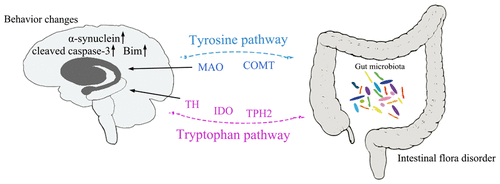当前位置:
X-MOL 学术
›
ACS Chem. Neurosci.
›
论文详情
Our official English website, www.x-mol.net, welcomes your
feedback! (Note: you will need to create a separate account there.)
MPTP induced Parkinson's disease in mouse: potential association between neurotransmitter disturbance and gut microbiota dysbiosis.
ACS Chemical Neuroscience ( IF 4.1 ) Pub Date : 2020-09-14 , DOI: 10.1021/acschemneuro.0c00475 Yuanhui Zhu 1 , Fei Huan 1 , Junfeng Wang 1 , Xuexue Xie 1 , Guoqin Yu 1 , Xi Wang 1 , Lei Jiang 2 , Rong Gao 3 , Hang Xiao 1 , Haixia Ding 4 , Jun Wang 1, 5
ACS Chemical Neuroscience ( IF 4.1 ) Pub Date : 2020-09-14 , DOI: 10.1021/acschemneuro.0c00475 Yuanhui Zhu 1 , Fei Huan 1 , Junfeng Wang 1 , Xuexue Xie 1 , Guoqin Yu 1 , Xi Wang 1 , Lei Jiang 2 , Rong Gao 3 , Hang Xiao 1 , Haixia Ding 4 , Jun Wang 1, 5
Affiliation

|
Recent studies have revealed significant roles of neurotransmitters and gut microbiota along the gut–brain axis in Parkinson’s disease (PD); however, the potential mechanisms remain poorly understood. In the current study, 1-methyl-4-phenyl-1,2,3,6-tetrahydropyridine (MPTP) induced characteristic PD neurobehavior changes accompanied by increased α-synuclein, apoptotic protein Bim, and cleaved caspase-3 and decreased expression of tyrosine hydroxylase (TH). Meanwhile, the tryptophan (Trp) and tyrosine (Tyr) neurotransmitter metabolites involving kynurenine (KYN), serotonin (5-HT), and dopamine (DA) pathways were significantly changed in serum. Furthermore, the step-limited enzymes, which are responsible for the key metabolic pathways of these neurotransmitters, were obviously dysregulated. The 16S rRNA gene sequence results indicated that the abundance and diversity of the microbiota were obviously decreased in MPTP-treated mice, the presence of Ruminococcus, Parabacteroides and Parasutterella genera were obviously increased, while Coriobacteriaceae, Flavonifractor, Lachnospiraceae, Lactobacillaceae, and Rikenellaceae abundance was markedly decreased. The connectivity between the gut microbiota and neurotransmitter metabolism revealed that the gut microbiota dysbiosis was associated with disturbance of the DA, KYN, and 5-HT metabolic pathways. Therefore, our results provide evidence that gut–microbiota–brain axis disturbance may play an important role in PD development and targeting this axis might provide a promising therapeutic strategy for PD.
中文翻译:

MPTP诱发小鼠帕金森氏病:神经递质紊乱与肠道菌群失调之间的潜在关联。
最近的研究表明,帕金森病(PD)沿肠脑轴的神经递质和肠道菌群具有重要作用。然而,潜在的机制仍然知之甚少。在目前的研究中,1-甲基-4-苯基-1,2,3,6-四氢吡啶(MPTP)诱导特征性PD神经行为改变,伴有α-突触核蛋白增加,凋亡蛋白Bim和caspase-3裂解以及NF-κB表达降低。酪氨酸羟化酶(TH)。同时,血清中涉及犬尿氨酸(KYN),血清素(5-HT)和多巴胺(DA)途径的色氨酸(Trp)和酪氨酸(Tyr)神经递质代谢产物发生了显着变化。此外,负责这些神经递质的关键代谢途径的限步酶明显失调。瘤胃球菌属,副细菌属和副鞭毛菌属明显增加,而结肠杆菌科,黄酮分枝杆菌,漆鞭草科,乳杆菌科和Rikenellaceae的丰度明显降低。肠道菌群与神经递质代谢之间的连通性表明,肠道菌群营养不良与DA,KYN和5-HT代谢途径的紊乱有关。因此,我们的结果提供了证据,即肠道-微生物群-脑轴紊乱可能在PD的发展中起着重要作用,而针对该轴可能为PD提供了一种有希望的治疗策略。
更新日期:2020-10-21
中文翻译:

MPTP诱发小鼠帕金森氏病:神经递质紊乱与肠道菌群失调之间的潜在关联。
最近的研究表明,帕金森病(PD)沿肠脑轴的神经递质和肠道菌群具有重要作用。然而,潜在的机制仍然知之甚少。在目前的研究中,1-甲基-4-苯基-1,2,3,6-四氢吡啶(MPTP)诱导特征性PD神经行为改变,伴有α-突触核蛋白增加,凋亡蛋白Bim和caspase-3裂解以及NF-κB表达降低。酪氨酸羟化酶(TH)。同时,血清中涉及犬尿氨酸(KYN),血清素(5-HT)和多巴胺(DA)途径的色氨酸(Trp)和酪氨酸(Tyr)神经递质代谢产物发生了显着变化。此外,负责这些神经递质的关键代谢途径的限步酶明显失调。瘤胃球菌属,副细菌属和副鞭毛菌属明显增加,而结肠杆菌科,黄酮分枝杆菌,漆鞭草科,乳杆菌科和Rikenellaceae的丰度明显降低。肠道菌群与神经递质代谢之间的连通性表明,肠道菌群营养不良与DA,KYN和5-HT代谢途径的紊乱有关。因此,我们的结果提供了证据,即肠道-微生物群-脑轴紊乱可能在PD的发展中起着重要作用,而针对该轴可能为PD提供了一种有希望的治疗策略。











































 京公网安备 11010802027423号
京公网安备 11010802027423号